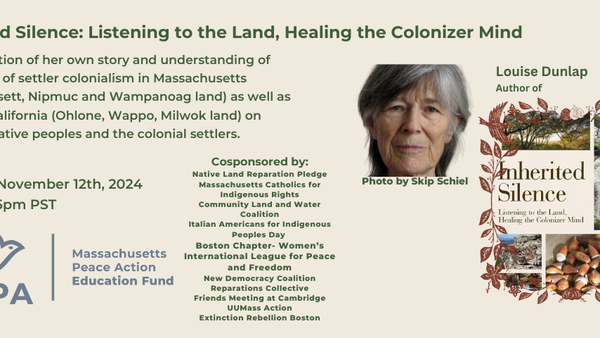
Book Club - Inherited Silence
Attend the event using this registration link
Louise Dunlap is author of Inherited Silence: Listening to the Land, Healing the Colonizer Mind, which traces her ancestors’ role in the violent colonization of what’s now “California” and “New England.” For many years she lived in the Boston area, teaching at UMass, MIT and Tufts and working with a range of peace and justice organizations including the Cambridge Peace Commission, Community Change, Inc., Coalition Against Apartheid, and Cambridge Eviction Free Zone. She often wrote for the AFSC’s PeaceWork on Indigenous solidarity issues and helped coordinate peace walks with The New England Peace Pagoda. Now back in Northern California, she supports a vibrant range of Land Return projects and is proud to pay shuumi (a land tax) to the Sogorea Te’ Land Trust. She practices Buddhism with the community of Zen Master Thich Nhat Hanh. More at https://louisedunlap.net/.
Inherited Silence tells the story of beloved land in California’s Napa Valley—how the land fared during the onslaught of colonization and how it fares now in the drought, development, and wildfires that are the consequences of the colonial mind. Author Louise Dunlap’s ancestors were among the first Europeans to claim ownership of traditional lands of the Wappo people during a period of genocide. As settlers, her ancestors lived the dream of Manifest Destiny, their consciousness changing only gradually over the generations.
When Dunlap’s generation inherited the land, she had already begun to wonder about its unspoken story. What had kept her ancestors from seeing and telling the truth of their history? What had they brought west with them from the very earliest colonial experience in New England? Dunlap looks back into California’s and America’s history for the key to their silences and a way to heal the wounds of the land, its original people, and the harmful mind of the colonizer.
It’s a powerful story that will awaken others to consider their own ancestors’ role in colonization and encourage them to begin reparations for the harmful actions of those who came before. More broadly, it offers a way for every reader to evaluate their own current life actions and the lasting impact they can have on society and our planet. It is a wake up call for non-Indigenous Americans and a touchstone for racial and environmental reckoning and healing in these perilous times.
Accessibility
Zoom but no CC